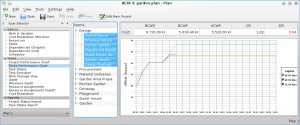Plan/Manual/Task Performance View: Difference between revisions
mNo edit summary |
m (Fix minor typos) |
||
| Line 1: | Line 1: | ||
==Task performance chart== | ==Task performance chart== | ||
On the task performance chart we can analyze deeply each | On the task performance chart, we can analyze deeply each subtask or task with the same indexes as for the project performance view. | ||
This is really useful in long and complicated project | This is really useful in a long and complicated project | ||
On the left window you can choose | On the left window, you can choose every single sub-task as well as an entire task, then on the right window will appear in the corresponding chart. | ||
[[Image:Plan_tasks_perf_chart.png|300px|thumb]] | [[Image:Plan_tasks_perf_chart.png|300px|thumb]] | ||
| Line 18: | Line 18: | ||
*SPI is the Schedule Performance Index. | *SPI is the Schedule Performance Index. | ||
{{Plan/Prevnext|prevpage=Project Performance View|indextext=Contents|nextpage=Task Status View}} | {{Plan/Prevnext|prevpage=Project Performance View|indextext=Contents|nextpage=Task Status View}} | ||
[[Category:Office]] | [[Category:Office]] | ||
Revision as of 10:30, 1 November 2019
Task performance chart
On the task performance chart, we can analyze deeply each subtask or task with the same indexes as for the project performance view. This is really useful in a long and complicated project
On the left window, you can choose every single sub-task as well as an entire task, then on the right window will appear in the corresponding chart.

where:
- BCWS means Budgeted Cost Work Scheduled,
- BCWP means Budgeted Cost Work Performed,
- ACWP means Actual Cost Work Performed.
All these are considered as effort in hours and costs.
PI are the Performance Indexes, where:
- CPI is the Cost Performance Index,
- SPI is the Schedule Performance Index.
